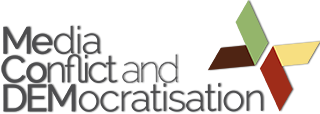A literature review by Irene Neverla, Judith Lohner and Sandra Banjac on journalistic ethics and practices is now available.
Download at: http://www.mecodem.eu/publications/working-papers
Executive Summary
The paper provides a critical review of literature on journalism in conflict societies (‘conflict journalism’), by investigating principal theories, concepts and arguments, as well as empirical research findings concerning journalism and its role in democratisation processes and conflicts. Against the background of MeCoDEM Work Package 4 (“Journalistic ethics and practices”), the paper focusses on journalistic actors and their journalistic work practices, role perceptions and ethical orientations. The following overall observations can be summarized from the literature review:
- Journalism can be defined as a social institution with the function to observe society and its various fields, selecting and providing topics for debate and decision-making by the wider public. Certain interrelated constituents inform journalistic performance and journalism culture: work practices, role perceptions, ethical orientations and structural conditions.
- Existing (comparative) research shows that journalistic practices, roles, ethical orientations and structural conditions are neither static nor globally uniform. Rather, the cultural, political and historical and economic contexts relevant to specific regions and countries have significant impact on journalists’ ethical orientations, role perceptions and work practices. Therefore journalism should be understood as one component in relation to many other societal components, as a relevant institution with a particular identity, logic of practices and ethics, but still embedded, dependent and limited within the societal context.
- Despite the rich findings in the research field on journalism, there is a lack of conceptualization and empirical investigations concerning the specific role of journalism and journalistic actors in democratisation conflicts. So far there is no elaborated theory on journalism in the context of conflict societies and transitional democracies. Only few empirical studies have focused on journalistic ethics and practices in democratisation processes and transitional countries.
- Due to a Western bias in journalism studies some areas of the world and non-western democracies remain either ignored or occupy a marginal position in comparative studies, and normative assumptions rooted in Western traditions remain largely unquestioned. What is needed therefore is a “dialogic” or “global approach” to journalism studies that would develop non-Western-biased concepts of journalism that extend beyond Western-grown models, incorporating valuable ideas and norms from both Western and non-Western traditions.
